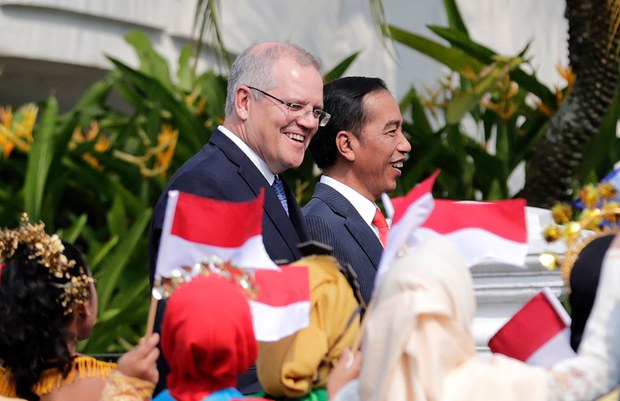Indonesia, Australia Push for Closer Economic Ties, Wrap-up Trade Deal
2018.08.31
Jakarta
 Australian Prime Minister Scott Morrison (left) walks with Indonesian President Joko Widodo during a welcoming ceremony at the presidential palace in Bogor, West Java, Indonesia, Aug. 31, 2018.
Australian Prime Minister Scott Morrison (left) walks with Indonesian President Joko Widodo during a welcoming ceremony at the presidential palace in Bogor, West Java, Indonesia, Aug. 31, 2018.
Indonesia and Australia hammered out a free-trade deal and agreed to bolster strategic ties on Friday as Canberra’s new leader, Scott Morrison, made his first overseas trip since taking power last week.
President Joko “Jokowi” Widodo hailed Australia – Indonesia’s next-door neighbor to the south – as “an important partner” after wrapping up the trade agreement with Morrison at the presidential palace in Bogor, near the Indonesian capital Jakarta.
“We reaffirmed the importance of economic openness and efforts to strengthen economic ties that are mutually beneficial,” Widodo told reporters.
He made the statement after completing “substantial negotiations” with Morrison on the free-trade deal, which was years in the making and expected to be signed by the end of 2018, pending legal fine-tuning.
Under the agreement, live cattle, meat and dairy products from Australia will enter Indonesia duty-free or at reduced tariffs, a prospect that has been cheered by farmers Down Under.
Australian investors will also be allowed to own majority shares in universities and build hospitals in Indonesia, Southeast Asia’s largest economy and home to more than 260 million people. Jakarta currently limits foreign ownership of educational institutions to 40 percent.
For its part, Indonesia is seeking the elimination of tariffs for 95 percent of its exports to Australia.
Morrison, 50, became prime minister last week after inter-partisan warfare ended Malcolm Turnbull’s short tenure as Australia’s leader.
Relations between Indonesia and Australia, two of the world’s largest economies, are often testy, but bilateral ties improved under Turnbull, with the two nations agreeing to restore full military cooperation in 2017.
History of spats
The two nations in the past few years have been embroiled in spats over issues such as Australia’s perceived interference in East Timor, a former Portuguese colony occupied for more than a decade by Indonesia but which voted for independence in 1998.
A diplomatic rift also took place in 2013 after reports surfaced that Australian intelligence services had spied on then-Indonesian President Susilo Bambang Yudhoyono and his inner circle.
Jokowi said he agreed with his new Australian counterpart on “the importance of respect for rule-based international order,” an apparent reference to China’s growing assertiveness in the disputed South China Sea.
Indonesia is not a party in the dispute over the South China Sea, where more than $5 trillion of global trade flows through each year, but fellow members of the Association of the Southeast Asian Nations (ASEAN) – Brunei, Malaysia, the Philippines and Vietnam – have overlapping claims in the mineral-rich sea region, as do China and rival Taiwan.
The overlapping claims are considered a flashpoint in the region and while claimants have agreed to refrain from any actions that would complicate the matter, China has been expanding and militarizing territories it occupies.
Jokowi said Indonesia and Australia had also agreed “to continue cooperation in the area of security, including cyber-security.”
Morrison said the economic partnership called the Indonesia-Australian Comprehensive Economic Partnership Agreement was “much more than a trade deal.”
“It’s not just a transaction,” Morrison told reporters in Jakarta. “It’s a partnership.”







